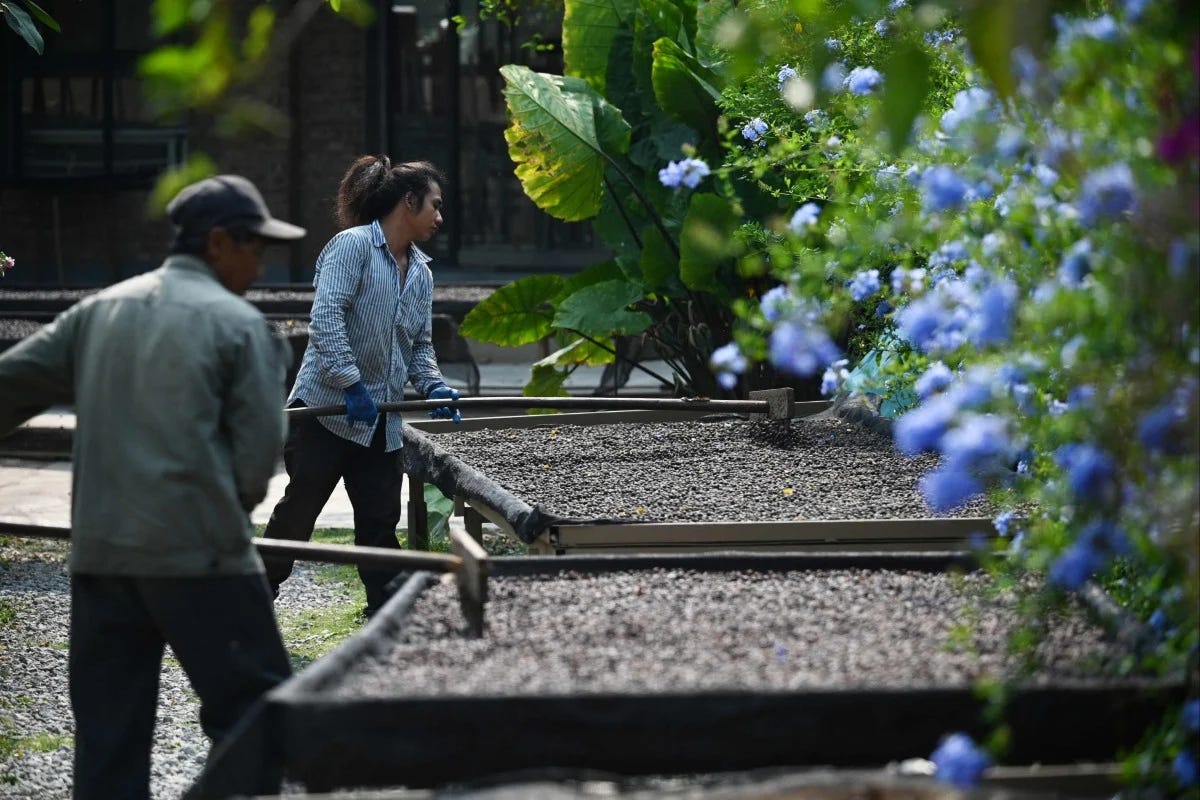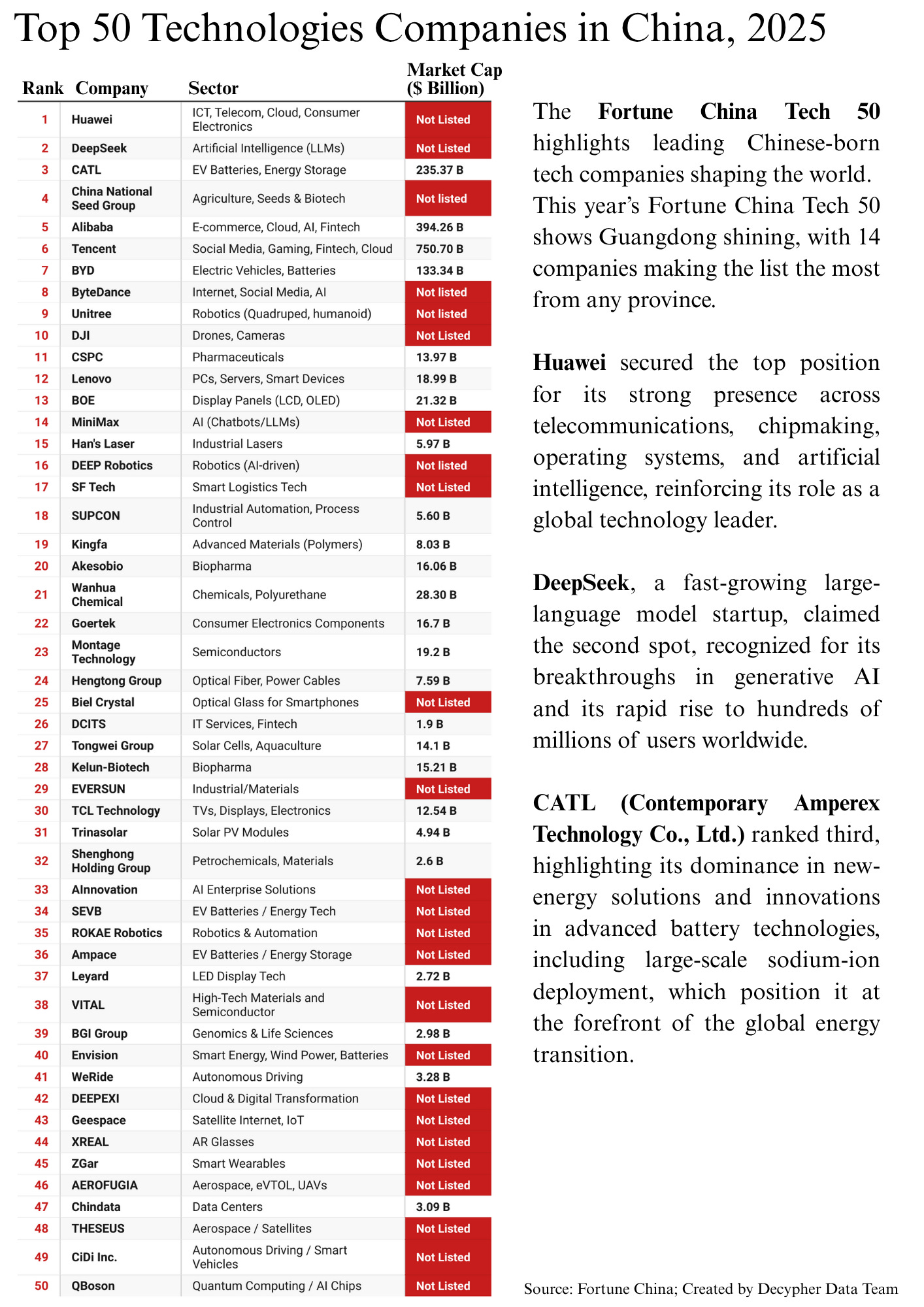China This Week: EU Telecom Rift, Flights with India Resume, Xi Eyes Taiwan in Trade Talks
This week in China, we explore key shifts in its domestic and foreign policy landscape.
China Quote 🗩
“Sun will greatly enhance the liaison office’s footing in the English media world, as Beijing seeks to improve China’s narrative in Hong Kong and the world,”
- China Daily senior editor to helm publicity efforts at Hong Kong liaison office
Economic Activity🏦
China phases out European telecom suppliers as EU lags on Huawei curbs
Asia Financial reports that China is replacing European telecom firms Nokia and Ericsson in its networks, citing national security reviews and localisation requirements that disadvantage foreign companies. Their combined market share in China has dropped from 12% in 2020 to 4% last year, while Huawei and ZTE still control about a third of the EU’s networks. The EU faces criticism for being slow to restrict Chinese equipment, with only 10 of 27 member states imposing limits by mid-2025.
Yunnan rides global coffee boom with record exports
SCMP reports that China’s southwestern province of Yunnan exported 7.7 billion yuan (US$1.1 billion) worth of coffee in the first eight months of 2025, with shipments to over 30 countries. Rising global prices and reduced supply from Brazil have boosted local growers, pushing raw bean prices up 65% since late 2024. Overseas demand is driving industrial upgrades and stricter quality controls, while Beijing promotes cross-border partnerships like the new China–Vietnam Coffee Trade Alliance.
Trump accuses Xi of using soybeans as leverage ahead of trade talks
Reuters reports that U.S. President Donald Trump said China is deliberately avoiding purchases of American soybeans to pressure Washington in trade negotiations. Trump, who meets Xi Jinping later this month in South Korea, warned that U.S. farmers are losing billions as China turns to South American suppliers. Expectations remain that Beijing could redirect agricultural purchases as part of a broader deal to ease tensions.
China’s reported BHP iron ore ban sparks economic and political concerns
The Guardian reports that Beijing has told Chinese steelmakers to halt purchases of BHP’s iron ore in a bid to pressure prices lower. The move threatens Australia’s largest export, worth over US$100 billion annually, and could impact federal revenues if prolonged. Analysts see the ban as a negotiating tactic, but it underscores China’s efforts to boost yuan-denominated trade and strengthen leverage with new projects like Guinea’s Simandou mine.
Inside China🐉
China’s new K-visa for foreign talent sparks backlash amid youth unemployment
CNN reports that Beijing’s new “K-visa,” launched on October 1 to attract young foreign science and technology professionals, has triggered strong criticism inside China. Social media posts with hundreds of millions of views highlight frustration that foreign recruitment comes as youth unemployment nears 19% and a record 12.2 million graduates face a tough job market. While state media defended the move as an opportunity to counter U.S. restrictions and boost innovation, critics argue it deepens anxiety over scarce high-quality jobs for Chinese youth.
China tests new AS700 crewed airship with flight over world’s highest bridge
SCMP reports that China’s Xiangyun AS700 completed a key low-altitude test flight over Guizhou, marking progress toward civilian and defence applications. The domestically built airship, capable of carrying 10 people and flying up to 700km, is designed for surveillance, rescue, and low-altitude economic uses. Military analysts note it could be deployed for persistent reconnaissance, offering advantages over drones and satellites at lower cost.
China and the World🌏
Xi eyes U.S. policy shift on Taiwan as leverage in trade talks with Trump
WSJ reports that Xi Jinping is seeking a formal U.S. statement opposing Taiwan’s independence, viewing Donald Trump’s eagerness for a trade deal as an opening to push his top strategic goal. While Washington’s long-standing position has been that it “does not support” independence, Xi wants explicit opposition, which analysts say would isolate Taipei and strengthen Beijing’s leverage. Trump has avoided clear commitments on defending Taiwan, and recent delays in U.S. military aid have raised concerns over whether trade concessions could outweigh support for Taipei.
Taiwan accuses China of misusing UN resolution to justify possible attack
Reuters reports that Taiwan’s government said Beijing is “deliberately misleading” the international community by interpreting UN Resolution 2758 as legal backing for its sovereignty claim over the island. Taipei warned the move aims to create a pretext for future military action, stressing only Taiwan’s elected government can represent its 23 million people. China insists the resolution affirms its “one China” stance, while the U.S. State Department criticised Beijing for “intentional mischaracterisation” designed to isolate Taiwan diplomatically.
China warns new U.S. consul in Hong Kong not to cross ‘four red lines’
Newsweek reports that Beijing’s envoy in Hong Kong cautioned U.S. Consul General Julie Eadeh against meeting pro-democracy figures or interfering in national security cases. The warning reflects Beijing’s continued hard line on foreign involvement in the city since the 2020 national security law, accusing U.S. diplomats of backing unrest. Washington dismissed the criticism, saying its envoys advance U.S. interests worldwide, but the episode underscores Hong Kong’s role as a flashpoint in U.S.-China tensions.
India and China to restart direct flights after five-year suspension
AP News reports that New Delhi and Beijing will resume flights between selected cities by late October, ending a suspension that began during the pandemic and extended through years of border tensions. IndiGo announced it will relaunch a Kolkata–Guangzhou route on October 26, part of efforts to “gradually normalize relations.” The move follows Prime Minister Narendra Modi’s recent visit to China, his first in seven years, as both sides seek to stabilise ties after deadly 2020 clashes in the Himalayas.
Malaysia’s Khazanah denies talks with China on rare earths venture
Bloomberg reports that Malaysia’s sovereign wealth fund Khazanah Nasional has dismissed claims it was negotiating with a Chinese state-owned firm on a rare earths processing project. Chief Investment Officer Hisham Hamdan said, “We are not in talks with anyone,” rejecting media reports of a potential partnership. The clarification comes as Southeast Asia faces rising geopolitical competition over critical minerals and China’s role in the supply chain.
China denies supplying arms used in Thai-Cambodia border clashes
Asia News Network reports that Beijing’s embassy in Thailand rejected claims it provided weapons to Cambodia for use in recent border clashes with Thailand. Responding to reports, including one in the New York Times, the embassy said China has “no self-interest” in the dispute and is working to de-escalate tensions through ASEAN mechanisms. The statement urged against “maliciously spreading false news,” as Bangkok’s foreign minister said he would raise the issue directly with Chinese diplomats.
China pushes to reshape global security governance through Lianyungang forum
Intelligence Online reports that Beijing used the 2025 Lianyungang conference to advance its vision of a new international public security order. Led by Public Security Minister Wang Xiaohong, China proposed initiatives aimed at positioning its intelligence and policing systems as models for global governance. The effort reflects Beijing’s broader push to embed its security frameworks into multilateral institutions and extend influence through Belt and Road-linked security cooperation.
Tech in China🖥️
China launches trial of underwater data centres to cut energy use
France 24 reports that a Chinese firm is preparing to submerge a capsule of servers off Shanghai, aiming to slash cooling costs by using seawater currents. The project, backed by government subsidies and powered largely by offshore wind, is among the world’s first commercial underwater data centres. While developers claim it can reduce cooling energy by up to 90%, experts warn of technical challenges and ecological risks, including thermal pollution and vulnerability to acoustic attacks.
Decypher Data Dive📊
The 2025 Fortune China Tech 50 highlights Guangdong as the top performer with 14 companies on the list, the most from any province. Huawei leads at number one for its strong footprint in telecom, chips, operating systems, and AI. Fast-rising AI startup DeepSeek secures the second spot for its breakthroughs in generative AI and rapid global expansion. CATL ranks third, underscoring its dominance in new-energy solutions and pioneering battery innovations.
Image of the Week📸
China’s PLA warships visit Hong Kong as part of National Day celebrations
— — —
Data By Bhupesh
Edited By Aurko
Produced by Decypher Team in New Delhi, India
— — —




